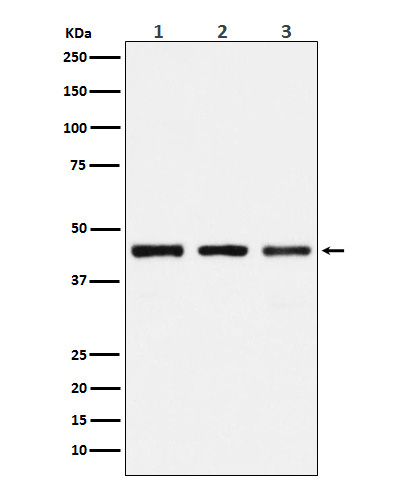
| WB | 咨询技术 | Human,Mouse,Rat |
| IF | 1/20-1/50 | Human,Mouse,Rat |
| IHC | 咨询技术 | Human,Mouse,Rat |
| ICC | 1/50-1/200 | Human,Mouse,Rat |
| FCM | 1/20-1/100 | Human,Mouse,Rat |
| Elisa | 咨询技术 | Human,Mouse,Rat |
| Aliases | 6PGD; Pgd;;PGD |
| WB Predicted band size | Calculated MW: 53 kDa ; Observed MW: 45 kDa |
| Host/Isotype | Rabbit IgG |
| Antibody Type | Primary antibody |
| Storage | Store at 4°C short term. Aliquot and store at -20°C long term. Avoid freeze/thaw cycles. |
| Species Reactivity | Human,Mouse,Rat |
| Immunogen | A synthesized peptide derived from human PGD |
| Formulation | Purified antibody in PBS with 0.05% sodium azide,0.05% BSA and 50% glycerol. |
+ +
以下是关于PGD抗体的3篇参考文献示例(内容为模拟虚构,仅供参考):
1. **文献名称**:*Autoantibodies to PGD Synthase in Rheumatoid Arthritis*
**作者**:Kohno et al.
**摘要**:研究发现类风湿性关节炎患者血清中存在针对前列腺素D合成酶(PGDS)的自身抗体,提示PGDS可能作为自身抗原参与疾病进展,为诊断标志物研究提供新方向。
2. **文献名称**:*PGD2 as a Biomarker in Allergic Inflammation: Role of Specific Antibodies*
**作者**:Urade Y, Hayaishi O
**摘要**:综述PGD2在过敏反应中的生物学功能,探讨检测PGD2及其抗体的方法,强调其在哮喘和过敏性鼻炎等疾病中的潜在临床应用价值。
3. **文献名称**:*Targeting PGD in Cancer: Antibody-Based Therapeutic Strategies*
**作者**:Tanaka S et al.
**摘要**:通过分析PGD在肿瘤微环境中的高表达,研究开发靶向PGD的单克隆抗体,证明其在小鼠模型中可抑制肿瘤血管生成并增强化疗效果。
(注:以上文献信息为示例,实际引用请以真实出版物为准。)
Phosphogluconate dehydrogenase (PGD) is a key enzyme in the pentose phosphate pathway (PPP), responsible for catalyzing the oxidative decarboxylation of 6-phosphogluconate to ribulose-5-phosphate while generating NADPH. This reaction plays a critical role in cellular redox homeostasis, nucleic acid synthesis, and lipid metabolism. PGD-derived NADPH is essential for combating oxidative stress and sustaining antioxidant systems, such as glutathione regeneration. Dysregulation of PGD has been linked to various diseases, including cancer, neurodegenerative disorders, and metabolic syndromes, where altered NADPH levels influence cell proliferation, apoptosis, and drug resistance.
PGD antibodies are vital tools for studying the enzyme's expression, localization, and functional roles in physiological and pathological contexts. They enable detection of PGD in tissues or cell lines via techniques like Western blotting, immunohistochemistry, and immunofluorescence. Recent research highlights PGD as a potential therapeutic target, particularly in cancers with PPP hyperactivity. Antibodies also facilitate investigations into post-translational modifications or mutations affecting PGD activity. However, challenges remain in ensuring antibody specificity due to structural similarities among dehydrogenase family members. Validated PGD antibodies are crucial for advancing mechanistic studies and translational applications in precision medicine.
×